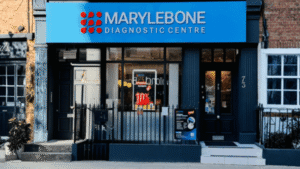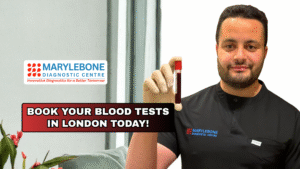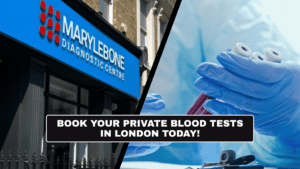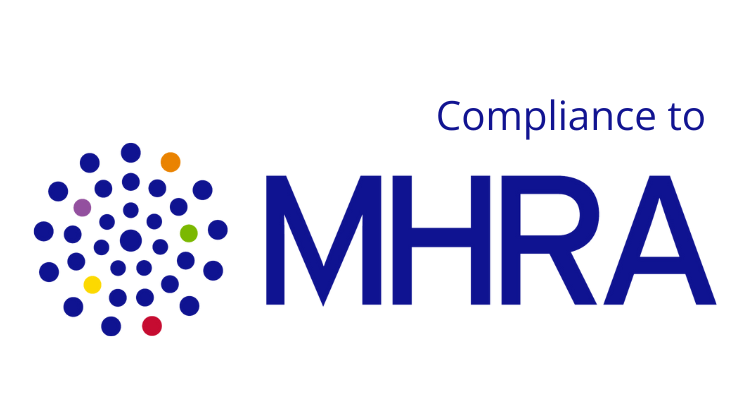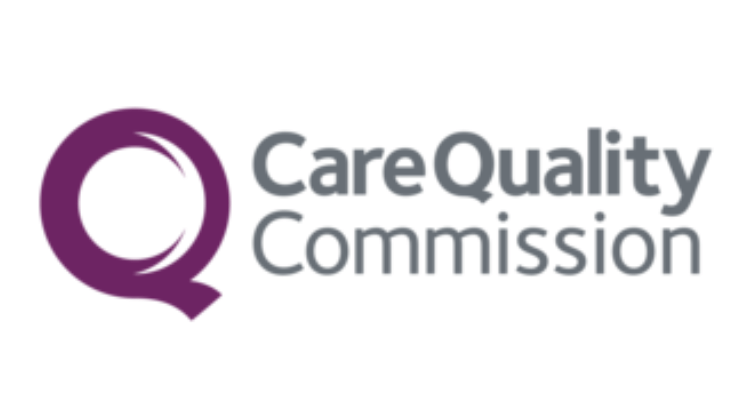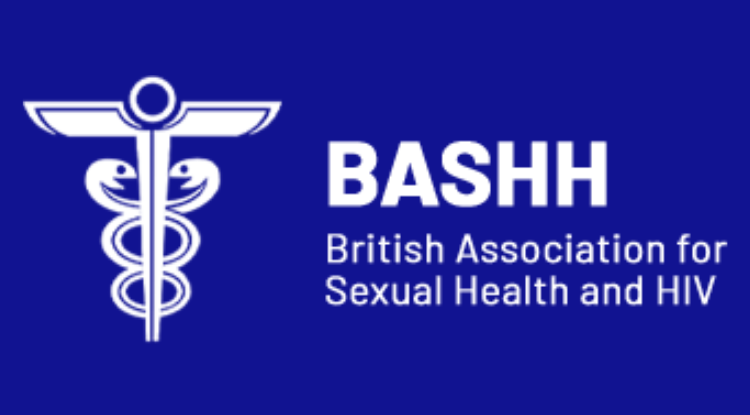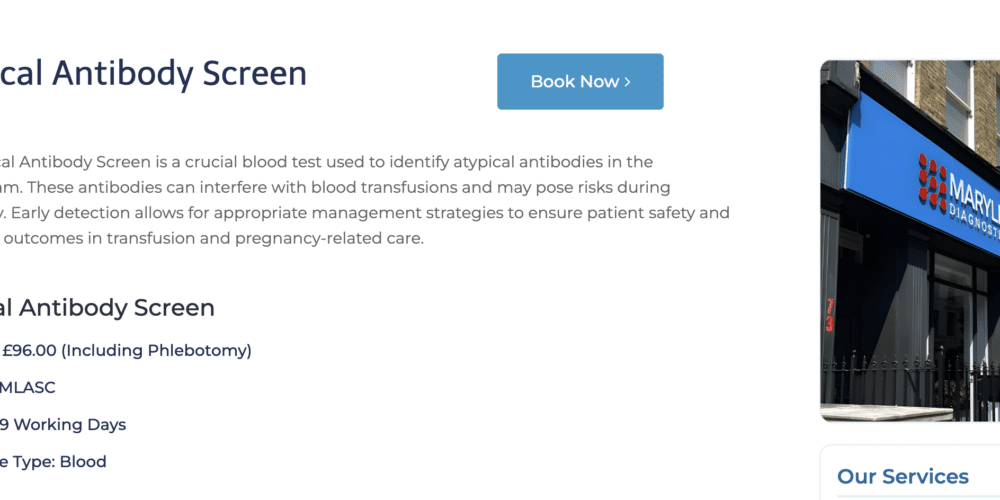
Atypical Antibody Test – What It Checks & When You Need It
Reviewed by Dr Lauren Holland • Marylebone Diagnostic Centre
Results within 24 – 42 hours. Westminster residents receive 20% off – BOOK NOW
An atypical antibody test checks whether your immune system has produced antibodies that target your own tissues or react in abnormal ways. These antibodies are not normally present in healthy individuals. When they appear, they may suggest inflammation, autoimmune activity, immune imbalance, or a reaction that requires further assessment.
Clinically, we see patients seeking clarity about unexplained symptoms such as fatigue, joint pain, skin changes, numbness, or persistent inflammation. Many are searching for answers after multiple GP visits without a clear diagnosis. An atypical antibody test helps identify whether the immune system is involved.
This guide explains what atypical antibodies are, what the test checks, when it is recommended, and how Marylebone Diagnostic Centre offers fast, private testing in central London.
What Is an Atypical Antibody Test?
An atypical antibody test checks for abnormal antibodies that react against the body’s tissues, blood components or proteins.
These antibodies can indicate:
- Autoimmune reactions
- Inflammatory conditions
- Immune dysregulation
- Specific disease patterns
- Underlying chronic immune activation
This test often forms part of a broader clinical review when symptoms are unclear or persist without explanation.
What the Atypical Antibody Test Checks
Depending on the panel requested, atypical antibody testing may screen for:
1. Autoantibodies
These target the body’s own tissues and are linked to autoimmune conditions.
2. Antibodies attached to blood cells
These can affect red cells, platelets or other blood components.
3. Non-specific abnormal antibodies
These may appear in chronic inflammatory states or infections.
4. Immune response irregularities
Certain antibodies rise when the immune system becomes overactive.
5. Markers associated with autoimmune conditions
While this test does not diagnose autoimmune disease alone, it provides useful clues when interpreted with symptoms and other results.
At MDC, this test is often combined with:
- Full Blood Count
- ANA profile (if requesting autoimmune screening)
- Vitamin D
- Thyroid markers
- Mineral tests
- General Health Profile
- Urine analysis
These help clinicians form a clearer picture of what the immune system is doing.
Why Atypical Antibodies Appear
Atypical antibodies can rise due to:
- Autoimmune activity
- Inflammation
- Chronic immune stimulation
- Viral or bacterial triggers
- Certain medications
- Unknown causes (idiopathic)
Atypical antibodies do not always mean disease.
Sometimes they appear briefly and resolve on their own.
This is why testing must be interpreted alongside symptoms and other blood results.
Symptoms That May Prompt an Atypical Antibody Test
Patients often request this test when experiencing:
- Persistent fatigue
- Joint pain or stiffness
- Skin rash
- Tingling or numbness
- Recurring infections
- Brain fog or concentration issues
- Unexplained inflammation
- Long-standing aches with normal routine tests
- Swelling
- Unexplained abnormal blood results
These symptoms do not diagnose a condition but can indicate the need for deeper immune investigation.
When You Need an Atypical Antibody Test
This test may be appropriate if:
- You have persistent symptoms with no diagnosis
- You experience fluctuating inflammation
- Routine blood tests are abnormal or inconclusive
- You suspect autoimmune activity
- You want a broader immune screen
- You are preparing for further autoimmune assessment
- Your clinician requests additional immune testing
At Marylebone Diagnostic Centre, many patients choose this test as part of a Wellness Profile or General Health Profile when symptoms have gone unexplained for months.
How the Test Works at Marylebone Diagnostic Centre
- You arrive at the clinic at 73 Baker Street
- A venous blood sample is collected by a trained phlebotomist
- Your sample is processed under the Marylebone High Standard
- Results are reviewed by our doctor.
- You receive a clear, clinically written report within 24 – 42 hours
Appointments are available Monday to Saturday.
Atypical Antibody Test Cost (MDC Pricing)
Atypical Antibody Test
Price: £96 BOOK NOW
Discount: Westminster residents receive 20% off
This test can also be added to:
- General Health Profile
- Wellness Profile
- Vitamin and Mineral Tests
- Thyroid Testing
- Urine Analysis
If you want, I can create a combined price table for all profiles that include this test.
What Your Results Mean
Results are interpreted by a clinical professional and must be reviewed in context.
Negative result
- Often reassuring
- Suggests no abnormal antibody activity detected
- Does not completely exclude autoimmune processes
Positive or raised suspicious antibodies
May indicate:
- Autoimmune activity
- Chronic inflammation
- Immune imbalance
- Blood cell–related antibodies
- A need for further testing
Your clinician may suggest additional blood tests or specialist referral depending on results.
Other MDC Tests Often Paired with Atypical Antibodies
To provide a complete picture, patients often combine this test with:
Full Blood Count
Shows inflammation, anaemia or immune changes.
Thyroid Function Test (TSH + FT4)
Some autoimmune conditions affect thyroid hormone levels.
Vitamin D Test
Low levels are common in immune dysregulation.
Mineral Analysis
Magnesium, zinc and copper influence immune balance.
Wellness Profile
Includes a broad panel of blood markers for overall health.
Urine Culture & Urinalysis
Useful if symptoms overlap with urinary or systemic inflammation.
MDC helps you choose the appropriate combination based on your symptoms.
Clinical Notes from MDC
Clinically, atypical antibody testing is often requested by patients who:
- Have normal routine blood tests
- Continue experiencing unexplained fatigue or pain
- Believe their symptoms may be autoimmune
- Want clarity after months of uncertainty
This test does not diagnose disease alone, but when combined with other markers, it provides important insight into immune activity. Patients often feel reassured when results guide the next steps.
FAQs
1. What does an atypical antibody test check?
It checks abnormal antibodies that may indicate immune or autoimmune activity.
2. Do atypical antibodies mean I have autoimmune disease?
Not necessarily. They can appear for many reasons and must be interpreted with clinical context.
3. How quickly will I get results?
Most results return within 24–42 hours.
4. What symptoms suggest I may need this test?
Fatigue, joint pain, inflammation, skin changes, neurological symptoms and persistent unexplained issues.
5. How much does the atypical antibody test cost?
Please refer to MDC’s current pricing. Westminster residents receive 20% off.
6. Can diet or lifestyle affect results?
Lifestyle influences overall immune health, but atypical antibodies typically rise due to immune activation.
7. Is fasting required?
No. Fasting is not needed.
8. Should I combine this with other tests?
Many patients add thyroid, vitamin, mineral, or Wellness Profile testing for a full assessment.
Book Your Atypical Antibody Test at Marylebone Diagnostic Centre
Marylebone Diagnostic Centre
73 Baker Street, London W1U 6RD
Tel: +44 7495 970109
Open Monday–Saturday, 08:00–16:00
Fast, private and confidential atypical antibody testing with results in 24–42 hours.
Westminster residents receive 20% off all tests.
Meta Title
Atypical Antibody Test London | What It Checks & When You Need It
Meta Description
Learn what an atypical antibody test shows and when it is recommended. Fast private testing in London with results in 24 – 42 hours. Westminster residents receive 20% off.


